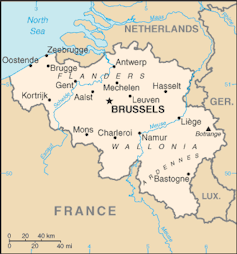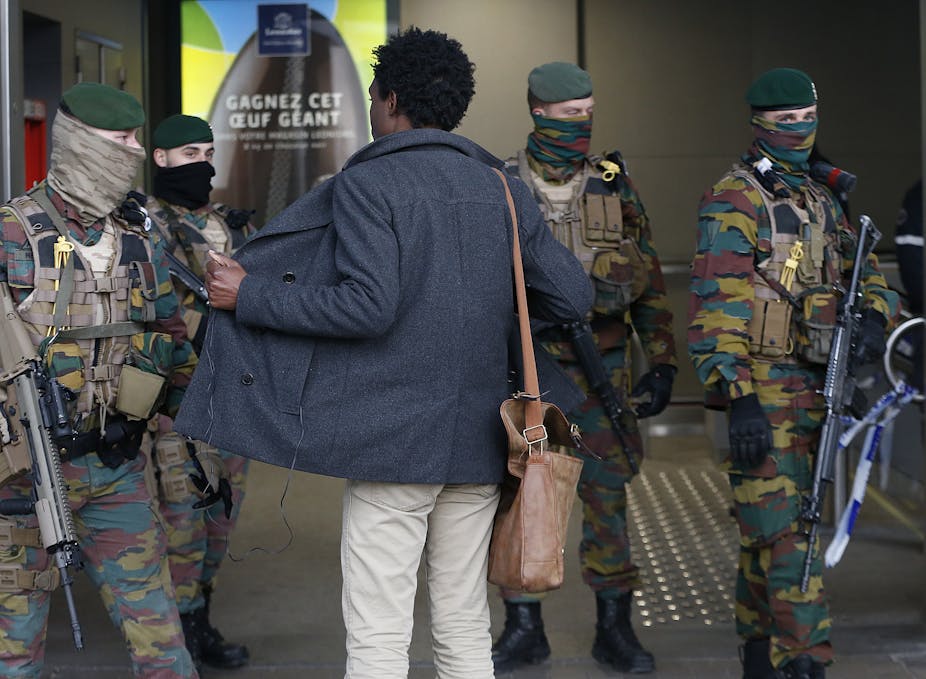Two attacks in Brussels last week left 31 dead and many others wounded. They also produced a barrage of criticism about the apparent laxity of Belgium’s intelligence and security services.
It is easy to criticize the many lapses that allowed this tragedy to unfold. Observers may wonder why Belgium security forces failed to heed an explicit warning from the European Union about the need to increase vigilance at its airports. And clearly Belgian authorities can be faulted for not acting on a warning from their Turkish counterparts that a known jihadi fighter, Ibrahim El Bakraoui, had been deported from Turkey to Belgium.
However, such criticism may be a bit misplaced. In my judgment, as a scholar who has worked in the field of national security studies for 30 years, there are compelling reasons that ensuring complete security against terrorist attacks, especially against vulnerable targets in Europe, is all but impossible.
Geography plays a role
At the outset, the continent’s geographic location places it at a significant disadvantage.

Belgium can easily be accessed from various parts of North Africa by land and sea. The terrorists from North Africa and the Middle East have deftly exploited these vulnerabilities to attack both Brussels and Paris.
In marked contrast to Europe, the United States enjoys mostly accommodating neighbors to its north and south and is surrounded by large bodies of water in the west and the east. These geographic features, while not rendering it impregnable, give it a much greater margin of safety and security.
Lack of coordination, cooperation

Other structural factors have also hobbled Belgium’s national counterterrorism strategy. This is a country that is highly federalized with local authorities jealously guarding their respective administrative jurisdictions. The existence of these regional divisions makes the task of sharing information and coordinating strategies more difficult.
These attacks may serve as a compelling wake-up call, altering how European security agencies work together. The U.S., it may be noted, was shaken out of any complacency in the aftermath of the terrorist attacks of September 11, 2001. In the wake of that attack, many of the problems of intelligence sharing across disparate organizations were addressed – if imperfectly. Most importantly, the U.S. created a separate organization, the Department of Homeland Security, designed to ensure the security of major ports of entry and exit into the United States.
A notable success
These hurdles notwithstanding, Belgian counterterrorist forces carried out a highly successful preemptive raid against some Syria-returned jihadis in the town of Verviers near the Belgian-German border in January of last year. According to Belgian authorities, the two men who were killed in the attack were planning a major terrorist event involving a strike against a police station in eastern Belgium. Ironically, in the view of some commentators, the success of this operation may have induced a degree of complacency among its security forces. It is now more than evident that there were organic links between the Brussels and Paris attackers. Najim Laacharoiu, the second suicide bomber, is believed to have been responsible for having helped design the bombs that were used both in Brussels and Paris.
Much has also been made of Belgium’s intelligence agencies failure to act on possible evidence of an oncoming attack. I believe these criticisms are a bit heavy-handed. All intelligence bodies across the world are faced with what communication theorists refer to a “signal to noise” ratio.
For example, in her classic study of U.S. intelligence failure on the eve of Pearl Harbor, Warning and Decision, Roberta Wohlstetter had noted that U.S. military officials were flooded with the “noise” of irrelevant information. This drowned out the “signal” of an impending attack. Intelligence analysts routinely pore over vast bodies of raw data that they receive based upon both electronic intercepts and from field operatives. Sifting through these massive quantities of information to find “actionable intelligence” is far from easy. In the absence of specific information that can be passed on to law enforcement organizations, intelligence agencies can do little with what they have on hand. In this regard, the Belgian slip-up was hardly exceptional.
Human error
Beyond this general problem that plagues most intelligence agencies, the possibilities of human error and oversight at local levels always lurk. This seems to have been the case in Schaerbeek, the ethnically mixed neighborhood where the two brothers, Ibrahim and Khalid el-Bakraoui, concocted their toxic brew. Evidence has now emerged the landlord who had rented an apartment to them had encountered malodorous fumes wafting from it. However, he chose not to inform the police. A resident of the building did go to the local police to alert them to the seemingly odd behavior of the two men. Following the report, an officer assigned to the area stopped by the building but failed to investigate further. In hindsight, his omission is lamentable. However, these human blunders are all too common. No organization or system has been devised that would eliminate all such errors.
Successes downplayed
As a number of reliable U.S. news organizations have reported, based upon conversations with European intelligence sources, a host of terror attacks have actually been thwarted in the United Kingdom, France, Germany and even in Belgium.
However, two practical concerns have inhibited counterterrorism officials from revealing more about the foiled plots. They argue that telling more about the planned incidents might tip off terrorist organizations about how much is already known about their plans, enabling them to alter their tactics and targets. Such revelations could also sow panic among the public about impending dangers.
The attacks in Brussels were no doubt tragic and disturbing. However, the many broadsides that have been launched against Belgian counterterrorist efforts appear ill-considered. Compelling reasons exist for the seemingly feckless lapses.

